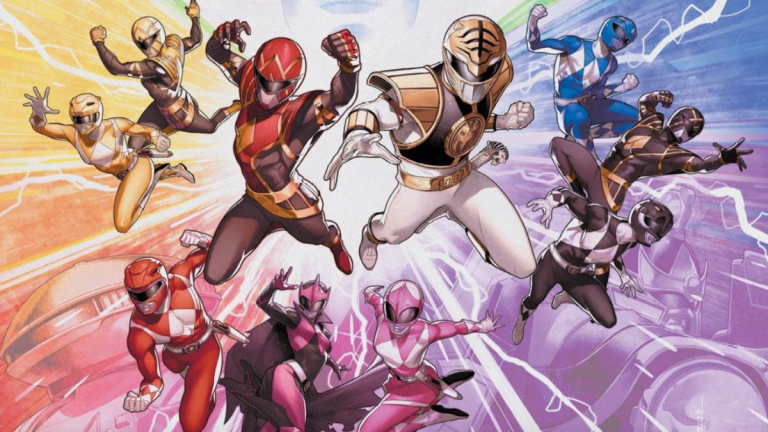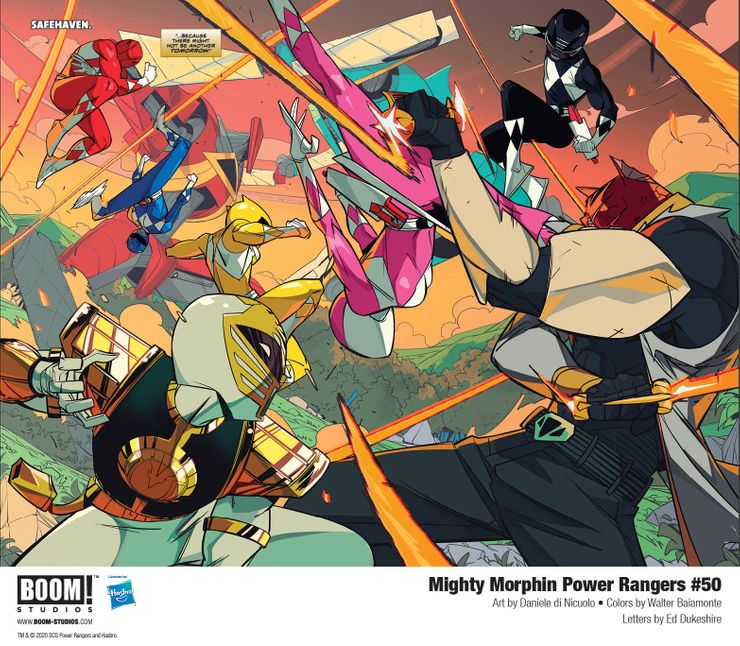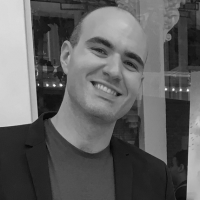The Long Journey of the Mighty Morphin Power Rangers Comic Series
Writer Ryan Parrott breaks down the landmark Mighty Morphin Power Rangers #50 and how it pays off everything from the past five years of comics.

Warning, this interview contains spoilers for Mighty Morphin Power Rangers #50 and the final issue of Go Go Power Rangers.
All of the Power Rangers comics that have been published in the last few years were leading to issue #50 of Mighty Morphin Power Rangers. All the plot lines and characters came together for a triumphant and climatic showdown that not only provided a lot of action but also closed off some character arcs while also setting some things up for the future.
We talked with writer Ryan Parrott about this gigantic issue and needles to say, this chat features NOTHING but spoilers both for MMPR and the last issue of Go Go Power Rangers. Our discussion includes adding conflict between the Rangers (which the show did little of), bringing back the Solar Rangers, Jason v. Tommy, how being an Omega Ranger is like going to college, and much more!
This is the first part of our interview Ryan covering issue 50. The next part coming soon will look to the future and what fans can expect going forward in the universe of Power Rangers comics.
DEN OF GEEK: Before we get to MMPR #50, we’ve got to talk about (the recently concluded) Go Go Power Rangers for a hot second. You and Sina Grace both helped fill in a gap that was perhaps the most glaring in the original series, giving Jason, Trini, and Zack a proper sendoff. Talk about finally making that happen.
RYAN PARROTT: Oh, I mean, that was kind of the whole point from the beginning. I felt like having met Austin and Walter, and talking to them about what that was like, and I always felt, “Yeah, we should probably try and use the comic books to find a way to make that all make narrative sense,” as opposed to all the crazy background noise that was going on. So, we were talking about the idea of the Omega Rangers very early on during Shattered Grid. Kyle Higgins and I had talked about it from the very beginning.
So, it was finally nice to be able to give them that and then give them a sendoff, but also know that it’s not the end of their story. It’s like, “Yeah, we’ll end their story in the continuity of the show, and do that properly but also know that this isn’t the end and we can give them more adventures and hopefully build out those characters in ways that I think people wanted, as opposed to the way it was cut short when we were a kid. And we’re just like, “Why are they all just silhouettes? Why is no one on screen?
Why is Jason holding a guitar over his face? That never gets old. And so, on going off of that, one of the defining parts of the original series, especially by season two once the show got popular, was that the Rangers almost completely lacked conflict with one another. Unless they were under a spell 95% of the time they were buddy buds. How did you go about adding all of this conflict between them in Go Go and MMPR, especially between Jason and Tommy?
With MMPR, it was easy because I knew when we brought in the Stone Canyon trio I remember we were talking about “that must’ve been really hard.” Like the idea that you’re going to step in when these other people have been doing this for a really long time, they saved the world countless times already. And it’s like, “You got to live up to those shoes. Oh, and by the way, you have to take on a villain that’s twice as hard as Rita.” I always thought, “There’s got to be some natural growing pains there.” Right? So, I love that we were able to start to hint at that, and that that’s what gave us Necessary Evil. It’s going to be about the old guard and the new guard and how those two will mesh together.
And then, we were dealing with Go Go, I always saw it as, when we were trying to figure out what that series was, I’d say, “Well, that story is about Tommy who needs to learn how to stay and Jason who needs to learn to leave.” That’s why we started it where we did with the idea of Tommy losing the green power coin and losing his powers and running off to the cabin, which made no sense in the original. A lot of cabins in California. But he just runs off, and there was a lot of him leaving all the time. So he goes from a character in the first two seasons of Power Rangers, somebody who leaves all the time, to someone who stays longer than almost anyone, which I thought was an interesting choice. So it was about doing that.
It was about giving (Jason and Tommy) cross-purposes. The idea that Jason has to learn that there are bigger responsibilities in being a Power Ranger and that there’s a larger universe outside of earth. And so, I thought, if you have those two characters who are both dealing with diametrically opposed philosophies and feelings, it automatically created a lot of tension. And so, I always knew that I was going to basically build to those two conversations, the one in, I think MMPR 45, where there’s the Omega Ranger and Tommy comes out and he says, “Hey, man, I don’t know what I’m doing here.” And then, the other one in (Go Go) 32 where it’s basically him saying, “Stay.” And I always wanted to have it be in the same location and have it be basically two sides of the same conversation.
I really loved what you did with Jason, especially with his dad. Was adding his dad in there a further way of making him want to stay but ultimately helping him realize he has to go?
Thank you. I really wanted to bring the dad thing back in because I felt like we dropped it. I know friends and family who when you talk to them and they’re in their normal life but they have all these personal problems that no one ever hears about. My mother has multiple sclerosis, so she’s always told me, “I don’t ever want what I have to keep you from being who you are going to be. I don’t want my sickness to stop you from achieving your dreams.”
And I thought there was something really interesting about having his dad, who is such a hard ass on him all the time, to be the one who actually, in a gruff way, says that very thing to him, saying, in a bad way, but, “Don’t let my sickness be an excuse for you not to be the thing you’re supposed to be,” which is probably the closest thing to an, “I love you,” you’re ever going to get from that character.

Did you worry that adding so much conflict between the characters would push the comic further from the events of the show? Because, after all, it feels like if you try to put them side by side, in the comic, they get mad at each other, but then in the show everybody’s buddy buddy and it’s fine.
The way that I looked at it was, the shows were 22 minutes and they’re short, and they didn’t show a lot of the stuff that’s going on. So, in the same way that in the early issues of Go Go we were filling in the gaps, I thought, “Well, there’s an opportunity to fill in the gaps here, too.” I felt like maybe the Power Rangers when we see them and they’re fighting villains, yeah they’re pretending everything’s fine. But then they take the helmet’s off 20 minutes later and it’s like, “You could have come back a little faster with that jump kick,”
So, that’s the way I rationalized in my head. When they’re a unit and they’re fighting, they’re keeping it real and they’re a unified front. But there’s always the background turmoil and stuff like that. And I just felt like if you were writing that show today, you would have more inner conflict. If anybody’s watching any CW show, that’s all of that.
I know when we talked over a year ago before Necessary Evil had even come out, I had asked you, “Is Beyond The Grid going to affect the story arc?” You said, “A lot,” I didn’t think it would take quite this long to get to that point, but in issue 50 you bring in Ari and Remy from Beyond the Grid. It was great to see them. Was it always your plan to bring them in at the end, and have we seen the last of them?
When we started breaking Necessary Evil, I was like, “Okay, I want to find a way to bring in all the arcs from Mighty Morphin zero and Go Go one all the way forward. There was a version at one point when we did the climax and I thought, “Well, I know I want the Solar Rangers to come in but how much do we want to bring them in?” There was a version where there was a much larger sequence, but ultimately, I felt there was so much going on that last issue, it just felt like, “Let’s just bring in the characters that we know. Let’s bring them in, in a way that, hopefully… We save their universe so they can come in and start to save ours.”
But I mean, the best thing about it was we created the Anointed and the Empowered, and they had this main line to the Morphin Grid. And I was trying to figure out like how we were going to defeat them. And I remember talking to Dafna (Pleban) my editor, and she said, “Well, in Beyond the Grid, they have the Solarix and it does suck up Morphin energy.” I went, “Wait a minute, you created a MacGuffin in another book that I can use for this so I don’t have to create a new one?” And she’s said, “Yeah.” I’m like, “We’re using that.” It was one of those things where I’d created this thing and I didn’t quite know how to solve it. I had other options, but I thought, “Oh, this actually works. It’s so much more seamless, and I don’t have to create anything new.”
So, yes, I always wanted to bring them in, and in the cleanest way possible so we can tie everything together at 50 and then hopefully use that as a way to springboard the next story. And could we see more of them in the future? Never say never.
Obviously, the editor plays a big role in the writing process for a comic like this. How much of the story is you versus the editor versus even the people who own the brands?
Everything starts with a conversation. For instance, when we first started figuring out Go Go I said, “That story was about what it was like for me in high school and when I had to go to another high school that my friends didn’t get to go to.” And I use that as the basis for (the Matt story.)
When the Omega Rangers came in that was about college. It was that thing where you step out into a larger world because when you’re a 17 or 18, that’s the first time you have real responsibility and real choices in your life. Up to that point, most people are just about what job you have and what your friends are doing or what person you’re dating. And this one was more like, “Oh, man, I have to figure out college. What am I going to do with the rest of my life?” And so, it’s that moment. Right
And then I love that moment when you go from high school to college where it’s all of a sudden you’re the small fish in a small pond. And you get to college and it’s all these new people and new experiences, and it’s overwhelming and you don’t know what you’re doing. And that’s how I saw the Omega Rangers.
What I liked about it was when we go into these things we always talk about them in regards to what are we saying with these characters at this time in their life. That’s where the conversation starts. And then, out of that, that’s when we start to create.
“Okay, wouldn’t that be interesting if we… Are there any unanswered questions from the show that we always wanted to address? Are there any characters you always wanted to use?” They start to come in and it basically becomes an organic process of you start with emotion and theme and you dig into that. THen you find how those characters can reflect that and then it folds out accordingly. But it’s never a straight line. That’s the fun thing about having people like Dafna and (editor) Matt Levine and all the other writers and all the people that matter, is that you start to find common ideas and themes and things that you like. “Oh, we all like this. We all feel this, so let’s go down that way.”
Stay tuned for part two of our interview with Ryan Parrott and some big teases for what’s coming next for the Power Rangers comics!
